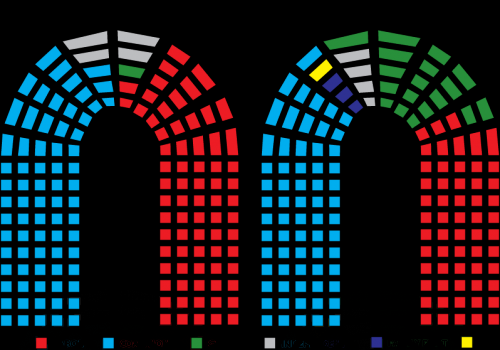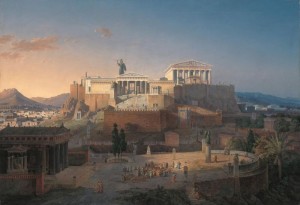I often find myself speaking enthusiastically about Open Democracy to someone online or in person, only to discover that their attention seems to be focused on a little fleck of foam on my lip. At least, it seems as if that is the case. So I am faced with an uphill battle to first prove I am not a nutter, and then talk a bit more about how Open Democracy will change the world.
Putting the possibility that I really am a nutter to one side for a moment, there seem to be a few core arguments against Open Democracy which need to be put to bed. First of these is that it will never catch on, as it requires too much engagement from the general populace. Second, that it is too difficult to design a system that is secure, powerful and easy to use. And third, there is the argument that people can’t be trusted with true democracy anyway.
The first objection, that people aren’t engaged in democracy, seems reasonable enough when you look at the world today for sure enough, no-one really seems to care who is in charge most of the time. Decisions made in government are only of concern to ordinary people on rare occasions. It is often said that these are times of political malaise in the west, in comparison to the situation in say the 60’s or the 30’s. Apart from a few of us who are active in political parties, we are either too jaded or too comfortable to care about it. But I think this situation is a result of the way democracy is currently run and that the antidote to it is Open Democracy. People would engage far more if they thought their engagement mattered. Open Democracy is all about empowering the people to be involved in decision making about how their country and planet is run. I think even a small taste of that power would lead to much greater engagement. But these are just suppositions. The fact is that even if most people remained disengaged – it wouldn’t matter. Open Democracy would be designed to allow decisions to be made without every person actively taking part all the time, or ever. This is through the ‘proxy’ mechanism described below. Open Democracy provides the means to be engaged when one wants – and can continue to operate with or without much voter engagement. However I do believe more voters would become more engaged if decision making in politics became ‘open sourced’. You only need to look into the effort that goes into something like wikipedia to see how engaged people can be when they can see the results.
The second objection, that is too difficult to design a system that is secure, powerful and easy to use, can really only be answered by the demonstration of such a system, which doesn’t currently exist. But I think there are no insurmountable hurdles to it existing. The first concern, that a voting system that worked through the internet could never be secure, is the one most often raised. And yet every day billions of dollars, and terabytes of sensitive information move around the globe through the internet. Indeed there are security glitches and I don’t think every one of these could ever be completely removed from a system that is that complex. But the point is that the financial system works. Security works on the internet already. A fully fledged open democracy system would have to be well resourced by government and continually monitored by security experts for hostile attacks. Numerous safeguards would have to be in place. I do not doubt the task would be difficult but it is not beyond our ingenuity to do it, especially when we already have a lot of experience in keeping data safe on the Internet. I do not think the few electronic voting experiments which have taken place around the world, accompanied by many controversies, are a good example of such a system. They seem to have been generally one off ventures poorly resourced and poorly executed. An open democracy system would be many orders of magnitude greater in scale and power, a more equivalent system to something like the network of an intelligence agency or very large financial institution.
Obviously such a complex system could not come into existence overnight. I think any shift to a completely Open Democracy would have to go through several stages. That is why parties like the Pirates are so important (as per a previous post). They are the test beds – Pirate Parties around the world are already using Open Democracy software to conduct internal party votes and discuss policy. The basics of such a system are falling into place. In fact, voting and commenting on issues are integral to web 2.0, and these technologies are already becoming refined and familiar to us all. It is no big step to craft this into a tool for debating and voting on legislation.
A key concept is the one of the proxy vote. Obviously not all members of a democracy can participate in everything that is happening all the time. But assuming all votes need a quorum to pass, it is essential to gather votes from offline members. This could occur by members pre-determining their voting intention, and it seems the safest way is by nominating a proxy, who is a member who participates in all votes. These ‘super’ members make their general policy stripes well known and seek to gather the trust of ordinary voters, so as to strengthen their own vote by accumulating proxy votes. They are similar to senators and delegates of the current parliamentary system but the fluidity of an open democracy means that there can be an unlimited number of them, and they can gain or lose our proxy vote at any time, for we can vote directly on any issue and are not forced to use a proxy. Also they are less likely to attract such a specific type of person as is attracted to politics today.
A system similar to this seems to already be in use in Germany by the Pirate Party there. I have no direct experience of it, but only know what I have read. In any case, it seems to me like this is a good basic system for enabling everyone to vote on an issue. The next step is for this vote to mean something in our Democracy. For this to happen, a Pirate Party member needs to be voted by conventional means into Parliament. Once this occurs, Open Democracy can really come into action. All that is required, is for the Pirate Party member to promise to vote in parliament in accordance with a vote that is concurrently held online using the Pirate’s Open Democracy system. In this way, all people using such a system will directly control the vote in parliament. This step would unleash the power of Open Democracy and would also be the point where maintaining confidence in the security of the system would become essential.
I think that seeing this tool in action would be the moment the penny would drop for the ordinary citizen. The moment we see a party member voting as a direct result of our wishes, is the moment we would realize the sham that is democracy today. For when does parliament vote in accordance with our wishes otherwise? Only if they have made an election promise, or it is convenient, or it is as a result of pressure from the press (which is hardly a mouthpiece of the people).
Once this realisation sunk in, a change would begin to occur in the way parties went to election. For what can be their excuse for not enabling direct participation in democracy once it has been proved to work? I can imaging a number of political parties springing up at this point each giving their own version of Open Democracy. There would be a lot of innovation, then a tipping point would be reached when the government would need to look at instituting a nationwide system. This could all happen very quickly, and I can’t really imagine what path things might take. I do think there would be resistance from those who benefit from the current system. Resistance might also come from the final argument mentioned in the start of this post, that people can’t be trusted with true democracy.
This is the hidden truth behind the longevity of the existing system. It works. We don’t go to war too often. The structure of society is preserved year to year. People generally benefit from the status quo. Problems have been ironed out over more than a century of use and critically, the general populace are kept at a safe distance from any real decision making. This is because as a rule, it is generally agreed that people can’t be trusted to make the right decisions. And I agree that most of us act self interestedly most of the time, and making decisions for the public good does not come naturally. This is democracy’s fundamental weakness, the threat of ochlocracy (mob rule). Once established, democracy is brilliant at keeping tyrants under control and allowing commerce to occur, but it must protect itself from itself, by obscuring decision making behind closed doors and being unaccountable in a detailed way to the voter.
And on this last objection I don’t really have an answer. I do think that most people are actually capable of behaving sensibly when they really are given the power to change things. I also think that there has to be some way of setting the scope of certain things – we may need to be protected from easily voting up a measure that would give us all 365 holiday days per year. I am sure that such a shift of power would be destabilising to our society – one can only imagine how international markets would react – the whole nation based system of governance could be thrown into disarray. But once the genie is out of the bottle there will be no putting it back, people are not going to hand their vote back to a piece of paper to have it shut away for four years. We will simply have to find a way to make it work – and when we do it will be so invigorating for human society, we will look back at the current times and wonder why such societies considered themselves democratic at all. We have become blind to the inefficiencies of the current system, but once the shutters are opened a sliver by a taste of Open Democracy, there will be no turning away from the light.
Oh and I also had an idea for a floating space port made of thousands of balloons 20-40km above the south pole, but I think I will have to save that story up for another day.



1 thought on “Open Democracy, and also, an idea for a floating space port”
Comments are closed.